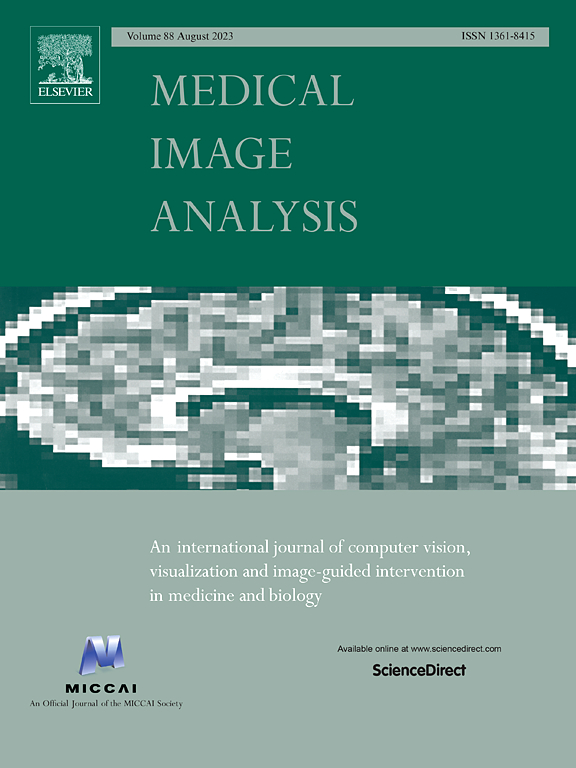弱监督下病变增强的模型展开快速MRI。
IF 11.8
1区 医学
Q1 COMPUTER SCIENCE, ARTIFICIAL INTELLIGENCE
引用次数: 0
摘要
磁共振成像(MRI)在异常检测和疾病诊断中的应用是公认的。然而,目前的成像方案往往受到扫描时间长和扫描过程与后续临床评估的具体要求不一致的阻碍。虽然最近的研究积极探索了加速MRI技术,但大多数研究都集中在提高所有体素位置的整体图像质量上,忽视了对具有临床意义的特定异常的关注。为了解决这一差异,我们提出了一种模型展开的深度学习方法,以弱监督病变注意为指导,以下游临床需求为导向的加速MRI。特别是,我们构建了一个以病变为中心的MRI重建模型,该模型结合了定制的可学习正则化,可以通过仅使用图像级标签来有效地学习,以提高潜在的病变重建,同时保持整体图像质量。然后,我们设计了一个专门的迭代算法来解决这个任务驱动的重建模型,并将其进一步展开为一个级联深度网络,用于病灶聚焦的快速成像。在fastMRI和斯坦福膝关节MRI多任务评估(SKM-TEA)两个公共数据集上进行的综合实验表明,我们的方法,即病灶聚焦MRI (LF-MRI),比现有的加速MRI方法有相对较大的优势。值得注意的是,LF-MRI在显示病理的区域有了实质性的改善。源代码和预训练模型将在https://github.com/ladderlab-xjtu/LF-MRI上公开提供。本文章由计算机程序翻译,如有差异,请以英文原文为准。
Model-unrolled fast MRI with weakly supervised lesion enhancement
The utility of Magnetic Resonance Imaging (MRI) in anomaly detection and disease diagnosis is well recognized. However, the current imaging protocol is often hindered by long scanning durations and a misalignment between the scanning process and the specific requirements of subsequent clinical assessments. While recent studies have actively explored accelerated MRI techniques, the majority have concentrated on improving overall image quality across all voxel locations, overlooking the attention to specific abnormalities that hold clinical significance. To address this discrepancy, we propose a model-unrolled deep-learning method, guided by weakly supervised lesion attention, for accelerated MRI oriented by downstream clinical needs. In particular, we construct a lesion-focused MRI reconstruction model, which incorporates customized learnable regularizations that can be learned efficiently by using only image-level labels to improve potential lesion reconstruction but preserve overall image quality. We then design a dedicated iterative algorithm to solve this task-driven reconstruction model, which is further unfolded as a cascaded deep network for lesion-focused fast imaging. Comprehensive experiments on two public datasets, i.e., fastMRI and Stanford Knee MRI Multi-Task Evaluation (SKM-TEA), demonstrate that our approach, referred to as Lesion-Focused MRI (LF-MRI), surpassed existing accelerated MRI methods by relatively large margins. Remarkably, LF-MRI led to substantial improvements in areas showing pathology. The source code and pretrained models will be publicly available at https://github.com/ladderlab-xjtu/LF-MRI.
求助全文
通过发布文献求助,成功后即可免费获取论文全文。
去求助
来源期刊

Medical image analysis
工程技术-工程:生物医学
CiteScore
22.10
自引率
6.40%
发文量
309
审稿时长
6.6 months
期刊介绍:
Medical Image Analysis serves as a platform for sharing new research findings in the realm of medical and biological image analysis, with a focus on applications of computer vision, virtual reality, and robotics to biomedical imaging challenges. The journal prioritizes the publication of high-quality, original papers contributing to the fundamental science of processing, analyzing, and utilizing medical and biological images. It welcomes approaches utilizing biomedical image datasets across all spatial scales, from molecular/cellular imaging to tissue/organ imaging.
 求助内容:
求助内容: 应助结果提醒方式:
应助结果提醒方式:


